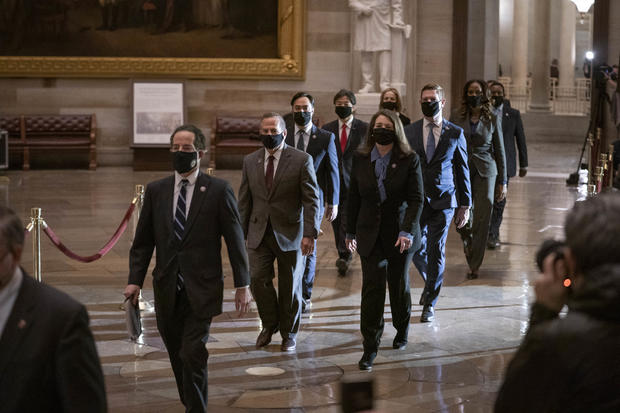Chief Justice Won't Preside Over Senate Impeachment Trial Of Former President Donald Trump
DALLAS (CBSDFW.COM) - On Monday, Jan. 25, House Speaker Nancy Pelosi formally sent the Senate the article of impeachment against former President Donald Trump for incitement of insurrection.
When the former President faces his second impeachment trial next month, Chief Justice John Roberts won't be presiding.
Instead, Democratic Vermont Senator Patrick Leahy will preside.
The Constitution says when a President is tried on impeachment, the Chief Justice shall preside, but there's no mention of who should oversee it when it involves a former President.
SMU law professor Eric Cedillo said the former President will likely raise the issue. "It'll probably be an appeal to the people listening to it more than anything else. The actual senators listening to what's going on, procedurally, if they have any issue with the way in which the President Pro Tem presides, then I'm sure that'll come up during the actual trial itself."
Senator John Cornyn tweeted his concern Monday.
"Unprecedented... How does a Senator preside, like a judge, and serve as a juror too? #conflictofinterest," he said.
But Senator Leahy vowed to administer the trial with fairness.
Constitutional law attorney David Coale said the Senate has held other impeachment trials without the Chief Justice presiding.
Coale said former President Trump could challenge the Senate trial itself in a federal court and ultimately the Supreme Court.
"I doubt the courts will be that interested, but it's a possibility. There is some reason why they might be interested. Or if he were convicted, like any criminal type proceeding and the court system, he could challenge that in court, saying this was not appropriate, this Senate lacked jurisdiction over me, and that would ultimately lead to some kind of opinion."
While a trial of a former President is unprecedented, the Constitution is clear when it comes to a conviction: 67 Senators, more than two-thirds of the members, must go along with it.
Cedillo said, "That higher requirement that the necessary need for, you know, reaching 67 votes is a very high watermark to reach in terms of them actually, finding him guilty and convicting him. So in practicality, I do think it's a check."
Coale agreed. "It's a part of an interesting separation of powers issue. We talk about the three branches of government, but here's one, where our framers divided power between the different houses of Congress in a way that made it particularly difficult for Congress to get something done and that's served us well."
WATCH FULL INTERVIEWS HERE:
MORE FROM CBSDFW
- Meal Delivery Driver With 3 Kids, Ryan Munsie, Identified As Murder Victim At Haltom City Apartment Complex
- Fort Worth Hires From Within, Naming Neil Noakes City's New Police Chief
- Collin County To Open Its First Large COVID-19 Vaccination Center Wednesday In Plano




